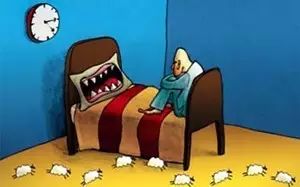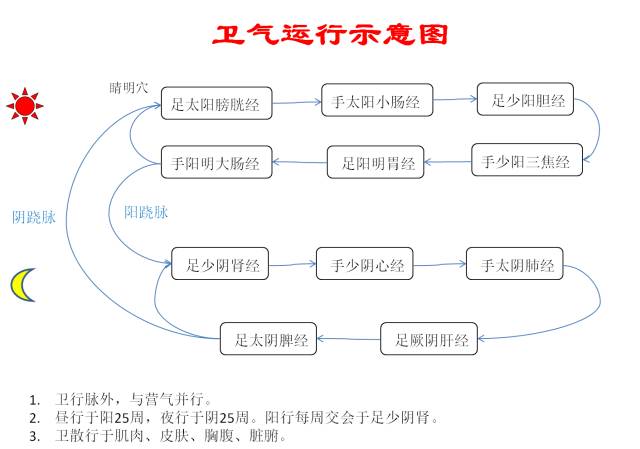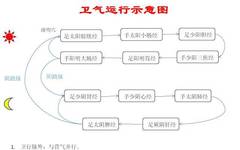Editor’s Note
|
In a day, our body requires at least 8 hours of rest, but in reality, insomnia follows us like a shadow, severely affecting our quality of life. Traditional Chinese Medicine (TCM) believes that insomnia is caused by the abnormal circulation of Yin and Yang energies, leading to a disruption in their balance. At night, Yang is excessive while Yin is deficient, resulting in restless sleep; during the day, excessive Yin and deficient Yang lead to fatigue and weakness. Based on the pathogenesis of insomnia, let’s listen to Teacher Zhu Yihui discuss how TCM treats insomnia! |
Insomnia is characterized by difficulty falling asleep and maintaining sleep, making it one of the most common sleep disorders, representing a subjective experience where sleep quality or quantity fails to meet normal needs.
Common clinical forms of insomnia include:
① Prolonged sleep latency: taking more than 30 minutes to fall asleep;
② Sleep maintenance disorder: waking up ≥2 times during the night or waking up too early in the morning;
③ Decreased sleep quality: light sleep and frequent dreaming;
④ Shortened total sleep time: usually less than 6 hours;
⑤ Daytime residual effects: feeling dizzy, lethargic, sleepy, and fatigued the next morning.
Insomnia is not only a physiological sleep disorder but also accompanied by psychological disturbances. Chronic insomnia patients often experience depression and anxiety, making them a high-risk group for depressive and anxiety disorders.

Insomnia can be summarized into three major syndromes: nighttime sleep disturbances, daytime residual effects, and the resulting psychological disturbances and emotional abnormalities, with the first two being the primary issues.
The clinical manifestations of insomnia are closely related to the abnormal circulation of Yin and Yang energies. At night, excessive Yang and deficient Yin lead to sleep disturbances; during the day, excessive Yin and deficient Yang result in fatigue and other daytime residual effects. Therefore, addressing the imbalance of excessive Yang at night and excessive Yin during the day with different treatment methods is key to treating insomnia.
Yin-Yang Imbalance is a Key Pathogenesis of Insomnia
The maintenance of normal sleep relies on the rhythmic growth and decline of Yin and Yang. The “Lingshu: Cold and Heat Diseases” states: “When Yang is excessive, the eyes are open; when Yin is excessive, the eyes are closed.” The “Lingshu: Questions of the Mouth” mentions: “When Yang is exhausted and Yin is excessive, the eyes close; when Yin is exhausted and Yang is excessive, one awakens.” If after dawn, Yin does not emerge and Yang remains, it leads to drowsiness; if after dusk, Yang does not enter Yin, it leads to insomnia. The fundamental pathogenesis of insomnia is the imbalance of Yin and Yang, which can be caused by the heart and kidney not communicating, spleen and stomach disharmony, liver fire disturbing the heart, or deficiency of both heart and spleen. Regardless of deficiency or excess, the imbalance of Yin and Yang is the key pathogenesis of insomnia.
As stated in the “Clinical Guidelines for Insomnia”: “The cause of insomnia, though not singular, is ultimately due to the failure of Yang to communicate with Yin.” The “Classified Evidence and Treatment: Insomnia” states: “Insomnia is due to the disease of Yang not communicating with Yin.” It is evident that sleep is Yin, and wakefulness is Yang; when Yang is strong, one is awake, and when Yin is strong, one sleeps. At night, “when Qi is exhausted and Yin is excessive, the eyes close,” and during the day, “when Yin is exhausted and Yang is excessive, one awakens.” Normal sleep results from the balanced operation of Yin and Yang; if there is an imbalance, with Yang not entering Yin, insomnia will occur.
Abnormal Day-Night Circulation of Yin and Yang Leads to Insomnia
The regular circulation of Ying and Wei Qi manifests in the body as a rhythmic alternation of wakefulness and sleep. Wei Qi circulates in the Yang aspect during the day (the six Yang meridians) and in the Yin aspect at night (the five organs). In the morning, Wei Yang emerges at the eyes, causing natural awakening, while at night, Wei Yang enters the Yin aspect, allowing for peaceful sleep.

The circulation pattern of Ying and Wei Qi reflects the rhythmic changes of Yin and Yang. When the circulation of Ying and Wei Qi follows its natural path, one can be energetic and mentally sharp during the day and maintain good sleep at night. The “Lingshu: Ying and Wei Meeting” states: “Ying is within the vessels, Wei is outside the vessels; Ying circulates continuously, and at fifty, it returns to the great meeting. Yin and Yang interpenetrate, like a ring without end.” The “Lingshu: Evil Guests” records: “Wei Qi… circulates in Yang during the day and in Yin at night, always passing through the lesser Yin of the feet, circulating in the five organs and six bowels.” The “Lingshu: Great Confusion” states: “Wei Qi circulates in Yang during the day and in Yin at night; thus, when Yang Qi is exhausted, one sleeps, and when Yin Qi is exhausted, one awakens.” This balance of Yin and Yang and the changes in Wei Qi’s entry and exit govern the alternation of wakefulness and sleep; therefore, any reason that causes Wei Qi to circulate in Yang at night and not enter Yin can lead to insomnia.
The relationship between the day-night changes of Yin and Yang and sleep has also been confirmed by modern research. Studies have found that the body’s temperature has a circadian rhythm, generally peaking in the evening or at night and reaching its lowest point in the morning. Sleep occurs during the decline of the core temperature curve and ends two hours after reaching the lowest point. The release of melatonin in the body also exhibits similar characteristics, beginning in the evening, peaking at midnight, and gradually declining after the second half of the night. The higher the concentration of melatonin in the body, the stronger the sleepiness. Therefore, disruption of the body’s circadian rhythm or misalignment with external circadian rhythms can lead to insomnia.
Some scholars believe that insomnia may be due to Yin deficiency failing to absorb Yang, or due to excessive Yang not entering Yin, ultimately stemming from the nighttime excess of Yang and deficiency of Yin, leading to an imbalance of Yin and Yang. In studies on chronic fatigue syndrome, it was found that patients with daytime fatigue as the main symptom and nighttime sleep disturbances exhibited abnormal changes in the circadian rhythms of core temperature, heart rate, blood pressure, salivary cortisol, and melatonin over 24 hours, characterized by the disappearance of diastolic pressure circadian rhythm, reduced amplitude of various indicators, and delayed peak phases of core temperature, heart rate, blood pressure, and salivary melatonin, while the peak phase of cortisol was advanced. The abnormal changes in the peak phases of melatonin and cortisol lead to sleep disturbances, which is the internal mechanism for patients with chronic fatigue syndrome to have difficulty falling asleep at night and waking up early in the morning.
Draining Yang and Nourishing Yin at Night to Promote Sleep
Based on the clinical manifestations of insomnia, the main symptom is the decreased quality of sleep at night. Therefore, improving nighttime sleep quality is the primary goal of treatment.
According to the “Lingshu: Questions of the Mouth”: “When Yang Qi is exhausted and Yin Qi is excessive, the eyes close; when Yin Qi is exhausted and Yang Qi is excessive, one awakens.” To achieve sleep at night, it is necessary to ensure that the patient has “Yang Qi exhausted and Yin Qi excessive” at night. The “Suwen: Golden Coffer True Words” states: “From noon to dusk, it is the Yang of the day, and within Yang, there is Yin; from dusk to rooster crowing, it is the Yin of the night, and within Yin, there is Yin.” Afternoon is the time when Yin Qi begins to grow, and nighttime is when Yin Qi gradually strengthens. By following the natural timing, addressing the nighttime excess of Yang and deficiency of Yin, and applying the method of draining Yang and nourishing Yin at night (or in the afternoon), one can drain the excess Yang at night and nourish the insufficient Yin, adjusting the state of “excess Yang and deficient Yin” at night to achieve the goal of harmonizing Yin and Yang, allowing for “Yang Qi exhausted and Yin Qi excessive, thus the eyes close.”
The method of draining Yang and nourishing Yin has significant therapeutic advantages for treating insomnia. Based on the TCM theory of “above is Yang, below is Yin” and the acupuncture treatment principle of “movement is draining, stillness is nourishing,” using the method of draining Yang and nourishing Yin for insomnia treatment, with points such as Yintang (Yin Hall), Baihui (Hundred Meetings), Fengchi (Wind Pool), and Yifeng (Wind Screen) for draining, and Sanyinjiao (Three Yin Intersection), Taichong (Great Surge), Taixi (Great Stream), and Zusanli (Leg Three Miles) for nourishing, shows better efficacy than oral medications like oryzanol, diazepam, or Qiye Shen’an tablets.
If the method of draining Yang and nourishing Yin can be combined with the timing of treatment at night, even better results can be achieved. By needling Baihui, Shenting, Touwei, Yintang, Shenmen, and Sanyinjiao at night, calming and tranquilizing the spirit, one can utilize the natural tendency of Yang Qi to hide in the body, guiding Wei Qi into the Yin aspect, which is superior to morning treatments in reducing the Pittsburgh Sleep Quality Index scores, improving sleep rates, and decreasing the use of hypnotic medications, and it has an immediate effect. Using a timed medication approach, taking the Anmei Evening Formula (with Bai Shao as the main herb, combined with Wu Jia Pi, Gui Zhi, and Zhi Gan Cao) at the You time (6:00 PM) can significantly lower patients’ Pittsburgh Sleep Quality Index scores and improve symptoms such as difficulty falling asleep and frequent dreaming.
Raising Yang During the Day to Alleviate Fatigue
Patients with insomnia often experience daytime residual effects such as dizziness, lethargy, sleepiness, and fatigue, which disrupt normal work, life, and study. Therefore, relieving and eliminating fatigue and other daytime residual effects is the ultimate goal of treating insomnia.
The normal state of sleep-wakefulness should be “daytime clarity – nighttime sleep,” while insomnia patients generally experience a disordered state of “daytime dullness – nighttime wakefulness,” leading to a vicious cycle of “daytime dullness – nighttime wakefulness.” The state of “nighttime wakefulness” leads to excessive Yin and deficient Yang during the day, causing fatigue and severely impacting daytime work, life, and mental state. With excessive Yin and deficient Yang during the day, Yang Qi cannot rise, leading to the situation at night where “Yang cannot be exhausted, and Yin has already been depleted,” thus “when Yin Qi is exhausted and Yang Qi is excessive, one awakens,” making it impossible to fall asleep.
The “Suwen: Golden Coffer True Words” states: “From dawn to noon, it is the Yang of the day, and within Yang, there is Yang… from rooster crowing to dawn, it is the Yin of the day, and within Yin, there is Yang.” In the early morning, Yang Qi begins to rise, and in the morning, Yang Qi gradually strengthens. According to the law of the rise and fall of Yang Qi throughout the day, the time from 6:00 AM to 8:00 AM is when the body’s Yang Qi gradually increases and Yin Qi decreases. Treatment during this time can align with the body’s increasing Yang Qi, invigorating it. Given that the daytime residual effects of insomnia are often manifestations of Yang deficiency, following the rising Yang Qi during the day, using the method of raising Yang can elevate clear Yang, awaken the spirit, and alleviate symptoms such as dizziness, lethargy, sleepiness, and fatigue, eliminating daytime residual effects and restoring normal work, life, study, and health. The psychological disturbances and emotional abnormalities caused by insomnia can also improve accordingly. At the same time, the daytime rise of Yang Qi invigorates the body, naturally allowing for “Yang Qi exhausted and Yin Qi excessive, thus the eyes close” at night. This can restore the normal sleep-wake state of “daytime clarity – nighttime sleep,” harmonizing Yin and Yang.
Emphasizing the raising of Yang also reflects the specific embodiment of the principle of “seeking the root cause in treating diseases” as stated in the “Suwen: The Great Discussion on Yin and Yang.” Yang Qi is to humans what the sun is to all things in the universe; it is the root of life activities and the source of spirit, Qi, and blood transformation. The “Suwen: The Path of Life” states: “Yang Qi is like the sky and the sun; if lost, life is shortened and not manifested.” The “Bian Que Heart Book: Must Know to Support Yang” states: “Daoists believe that by eliminating Yin shadows and cultivating pure Yang, one can transcend the mundane and ascend. Thus, it is said: Yang essence is like a thousand-year lifespan, while Yin Qi, if strong, must be harmful. It is also said: If Yin Qi is not eliminated, it is still death; if Yang essence remains, there is longevity. Therefore, as a physician, one must understand that supporting Yang Qi is fundamental.” It is evident how important Yang Qi is to human life. With Yang Qi, there is life; without it, there is death. Therefore, clinical treatment should protect Yang Qi and not excessively drain it.
Conclusion
In summary, insomnia is caused by the abnormal circulation of Yin and Yang energies and their imbalance. Excessive Yang at night leads to restless sleep; “nighttime wakefulness” also causes excessive Yin and deficient Yang during the day, resulting in fatigue and severely impacting daytime work, life, and mental state. The vicious cycle of “daytime dullness – nighttime wakefulness” exacerbates insomnia.
If one can follow the natural timing, addressing the nighttime excess of Yang and deficiency of Yin, and apply the method of draining Yang and nourishing Yin during the gradually strengthening Yin at night (or in the afternoon), one can drain the excess Yang at night and nourish the insufficient Yin, achieving the goal of harmonizing Yin and Yang, allowing for “Yang Qi exhausted and Yin Qi excessive, thus the eyes close.” Following the rising Yang Qi during the day, addressing the daytime excess of Yin and deficiency of Yang, and applying the method of raising Yang can elevate clear Yang, awaken the spirit, and alleviate daytime symptoms such as dizziness, lethargy, sleepiness, and fatigue, eliminating daytime residual effects and restoring normal work, life, study, and health. The psychological disturbances and emotional abnormalities caused by insomnia can also improve accordingly.
At the same time, the daytime rise of Yang Qi invigorates the body, naturally allowing for “Yang Qi exhausted and Yin Qi excessive, thus the eyes close” at night. Using the methods of nourishing Yin at night and raising Yang during the day, one can ensure that during the day, “Yin Qi is exhausted and Yang Qi is excessive, thus one awakens,” and at night, “Yang Qi is exhausted and Yin Qi is excessive, thus the eyes close,” forming a positive cycle of “daytime clarity – nighttime sleep” and “Yin balanced with Yang,” harmonizing Yin and Yang without harming the fundamental Yang Qi of life, aligning with the principle of “seeking the root cause in treating diseases,” potentially achieving better therapeutic effects.
》》Related Links: Pittsburgh Sleep Quality Index
The Pittsburgh Sleep Quality Index (PSQI) was developed by Dr. Buysse and colleagues at the University of Pittsburgh in 1989. This scale is suitable for evaluating sleep quality in patients with sleep disorders and mental disorders, as well as for assessing the sleep quality of the general population.
PSQI is used to assess the subject’s sleep quality over the past 1 month, consisting of 19 self-rated items and 5 other-rated items, with the 19 self-rated items and 5 other-rated items not included in scoring. The 18 items form 7 components, each scored from 0 to 3, with the cumulative scores of each component forming the total PSQI score, which ranges from 0 to 21. A higher score indicates poorer sleep quality.
| Author Introduction|
Zhu Yihui, chief editor of the national-level planning textbook “Rehabilitation Assessment” for higher education during the 11th Five-Year Plan, serves as the deputy editor of the TCM graduate textbook “Introduction to Acupuncture Schools” for national higher medical colleges, deputy editor of the refined textbook “Selected Works of Acupuncture Literature” for national higher TCM colleges, and editorial board member of the new century national higher TCM college textbook “Various Acupuncture Theories.” He has co-authored and published works such as “Unique Acupuncture Techniques in Chinese Folk Medicine” and “Pain Syndrome Tuina,” and teaches graduate courses such as “Selected Works of Acupuncture and Tuina Literature” as well as undergraduate courses like “Acupuncture” and “Selected Works of Acupuncture Literature,” possessing a deep understanding of traditional acupuncture theory.
Source: Chinese Journal of Traditional Chinese Medicine(2016-10), images from the internet/Edited by: Muzi
» If you find this article valuable, please share it with your friends!
|
One article a day, sharing secrets to nourish the heart, body, and spirit. TCM treasures, there must be one that suits you! |
Click “Read the original text”, discover more exciting content… ↓↓↓

